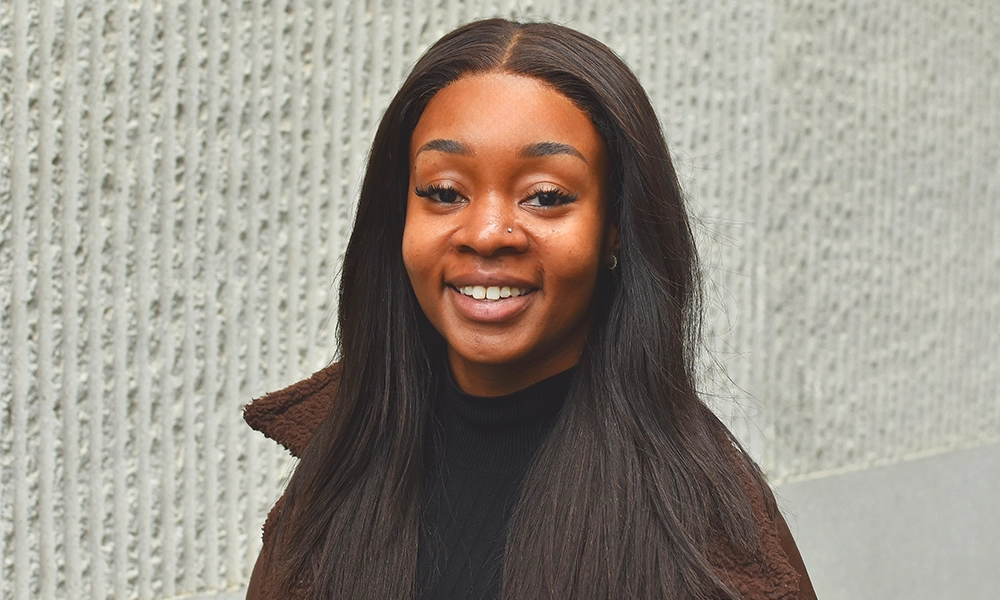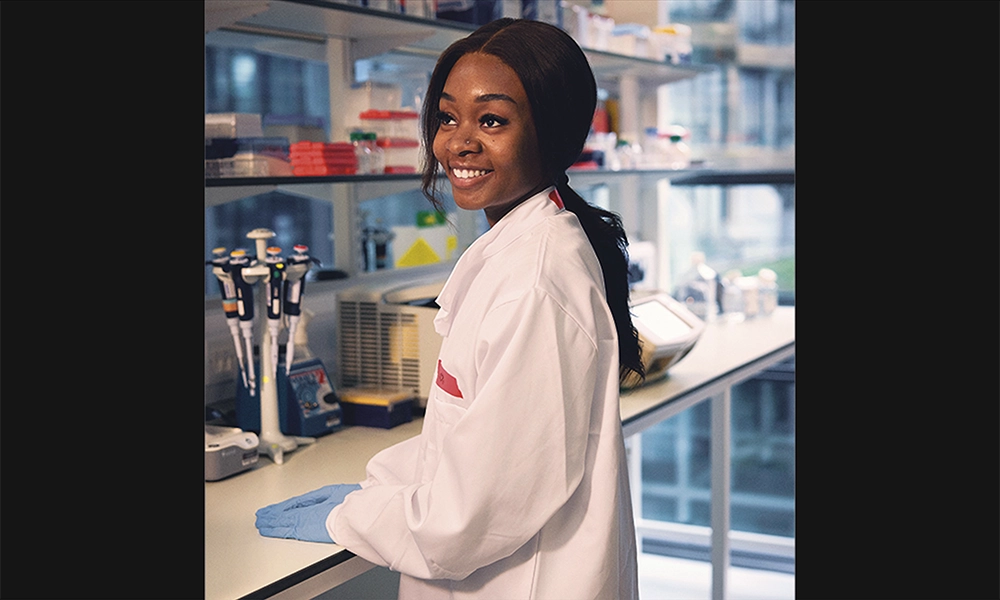Senior research associate Deborah Ojutalayo, one of the faces of Canary Wharf Group’s Where Ambition Lives campaign, on her scientific passions

Subscribe to our free Wharf Whispers newsletter here
One of the key features of Canary Wharf Group’s Where Ambition Lives campaign is its focus on dispelling popular, enduring misconceptions about the estate.
Diving deeper into that message, Wharf Life has interviewed some of the Wharfers featured, including Deborah Ojutalayo.
“When I tell people I work in Canary Wharf as a scientist, they can’t envisage what I do,” she said.
“They wouldn’t necessarily see my work and Canary Wharf in the same sentence.”
The senior research associate at AviadoBio spends her days in the rapidly growing company’s labs a few storeys above the increasingly bustling thoroughfare of Water Street on Wood Wharf.

confounding the stereotype
“People think of the area as a hub for financial services businesses – but it is actually a really nice blend of people working in lots of different industries,” said Deborah, who joined the life sciences startup in 2021 before it moved to the Wharf a little over a year ago.
“When I got the job, we were based in Hatton Garden, which was weird because people always associate that with jewellery.
“We were in a really tiny lab with eight employees.
Now we have around 60 – we’ve expanded quite quickly and moved to Whitechapel before coming to Canary Wharf.
“We are a gene therapy company. Certain diseases are caused by faulty genes or other mutations in your body.
“What we’re doing is developing a virus that will deliver a healthy gene to the patient with a focus on tackling dementia and motor neurone disease.
“My role is to carry out the pre-clinical testing before it is ready for trials in animals and patients.
“The viruses we work with don’t themselves cause harmful illnesses – we modify them so they are safe to use.
“I perform my tests using different types of cells – from humans, monkeys, pigs and mice – to make sure the virus is working as expected.
“I check we’re seeing the results we want, a reduction in faulty genes or an increase in the function of healthy genes.
“Only once we’ve made sure its safe, a process that can take many months or even years, does a therapy move on to animal studies and then human clinical testing.
“It’s essential we avoid any off-target effects – for example, we don’t want to affect the heart if we’re targeting the brain.”
a career in science
Growing up in Forest Gate in Newham, Deborah decided to pursue a career as a scientist after her mother ruled out working for the police.
She graduated with a first in Biomedical Science from the University Of Westminster before completing a masters at the same institution in Immunology.
She said: “I just love science. During my first degree I found out I had a passion for research, conducting various projects including one looking into parasitic disease.
“It was then I thought this could be a career path for me. In my field, there are typically two paths – academia or industry.
“I wanted to work in the latter because I wanted my work to have an impact on patients and to see the fruits of that.
“You have to be patient, but it’s rewarding to work on projects that you see through to the end.
“Sometimes we get patients coming in with diseases or conditions that there’s currently no cure for.
vWe get to understand how their suffering affects them and their families.
“That’s what gives me motivation – there’s the trust those patients put in us to hopefully find something that will cure them and gene therapy has a lot of potential.
“We’ve already seen successes in areas such as Sickle Cell Disease with a treatment now approved by the NHS for severe cases.”
highlighting career pathways
Deborah is also driven by something else – a desire to highlight and promote careers in science, especially to those who might not have considered it before.
“I’m very passionate about speaking to young people, so a lot of what I do is going into schools and speaking to students who have an interest in STEM or science about my journey,” she said.
“My career pathway from school was not that clear, and people are not necessarily aware of the different opportunities that are open to them.
“I can see that people are interested in it, so I try to convey science in a very simple way that people can understand.
“I really want to inspire the next generation.
“I like to think of myself as still young and having someone other than a teacher speaking to students in school on a casual, one-to-one level really works. They love it.
“That communication is important because when science is spoken about, a lot of the time it’s when there’s been a breakthrough, but people don’t necessarily understand the process.
“Science is not just that big, final reveal, it’s incremental progress.
“One of the reasons I share my work on social media is so that people can understand what my day as a senior research associate looks like. Science is cool.
“When you think of a scientist, you might think of old, boring people, which is just not the case.
“In the lab I’m surrounded by brilliant, intelligent people but nobody is prideful, thinking they’re the smartest.
“There is a constant flow of information and everyone has their own area of expertise, so it’s mentally stimulating.
“Of course we have the radio on – it’s a fun atmosphere too.
“Sometimes if an experiment is taking a long time I’ll use the length of certain songs to measure it.
“I like anything upbeat, like Afrobeat to keep me going. Especially if it’s a really long experiment.
“I’m half Ugandan and half Nigerian.
“I went to Uganda recently to see how their healthcare system and diagnostic facilities work. They’re not great.
“I don’t know how I’ll get there, but one day I’d love to be able to create something that addresses that and benefits people there.”
You can find out more about Deborah’s work on the Wharf via @debsdiary6 on Instagram and TikTok.
key details: AviadoBio
AviadoBio is based at 20 Water Street in Canary Wharf and is currently working on medicines to help people with frontotemporal dementia and amyotrophic lateral sclerosis.
You can find out more about the company on its website.
Read more: Why a degree in hospitality and tourism can boost your career



